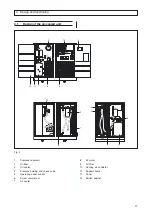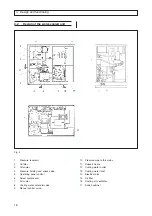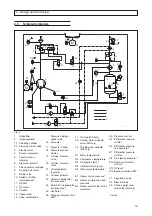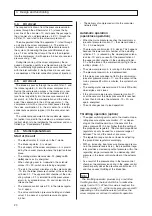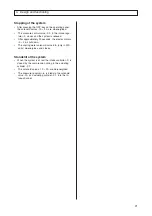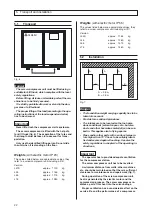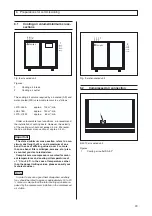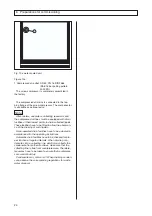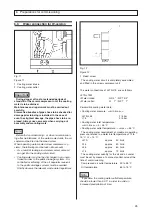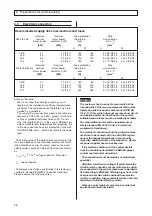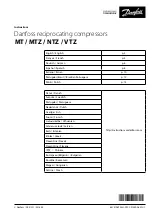
11
Noise
Sound-proofing elements on the machine/unit have to
be active during operation (i.e. sound-proofing panels
closed, etc.).
Wear personal ear protection as prescribed.
Noise, even at a low level, can cause nervousness
and annoyance; over a longer period of time, our nerv-
ous system can suffer serious damage. We therefore
recommend a separate machine room in order to keep
the noise of the machine away from the workshop.
Depending on the number of machines in a machine
room, the noise can be quite loud. In accordance with
the sound pressure level at manned posts, the follo-
wing precautions have to be taken :
• Below 70 dB(A) :
No special measures
• Above 70 dB(A)
Persons who stay permanently in this room have to
wear ear protectors
• Below 85 dB(A)
In the case of occasional visitors who stay in this
room only for a short while, no special precautions
are to be taken
• Above 85 dB(A)
Hazardous noise zone ! A warning sign has to be at-
tached to each entrance indicating that everybody
who enters the room - even for a short time only -
has to wear ear protectors.
• Above 95 dB(A)
The warning signs have to contain the recommenda-
tion that occasional visitors also have to wear ear
protectors.
• Above 105 dB(A)
Special ear protectors, which are suitable for the
noise level and the spectral composition of the noise
must be available. A corresponding warning sign
must be fixed to each entrance door.
Take care that the noise transmission through walls
and frames does not result in too high a noise level in
the surrounding areas.
3. Safety regulations
for the assemblies concerned before carrying out any
repair work.
Hydraulic and compressed-air lines must be laid and
fitted properly. Ensure that no connections are ex-
changed. The fittings, lengths and quality of the hoses
must comply with the technical requirements.
Oils, greases and other chemical sub-
stances
When handling oils, greases and other chemical sub-
stances, observe the safety regulations for this product!
Be careful when handling hot fuels and consumables
(danger of burning or scalding)!
Rooms subject to explosion hazards
Danger
.
Compressor units must never be operated in areas
subject to explosion hazards!
(Exception: Special units with the corresponding
technical modifications)
3.7
Storage of compressors
All compressors are protected against corrosion at the
factory for transport and for brlef storage before
commissioning.
If the compressors are to be stored for period
exceeding six months, additional precautions must be
taken.
Compressors which are to be shut down for a lengthy
period must also be protected from corrosion.
Since corrosion occurs more quickly in damp
atmospheres than in dry conditions, it is not possible to
specify a maximum permissible standstill time which
will apply in all cases.
Note
The following aspects must be taken into account for
storage of storing compressors.
The compressor should be stored in a dry building
which should be heated if possible.
This is particularly true during the months of winter.
If there is a risk that the temperature will fall or rise
above the limits of -10 °C to +65 °C , the electrical
controller must be removed and stored in ambient
temperatures of +5 °C to +30 °C.
Before commissioning the compressor all the
electrical and electronic components and units should
be checked for the ingress of water or condensation.

















